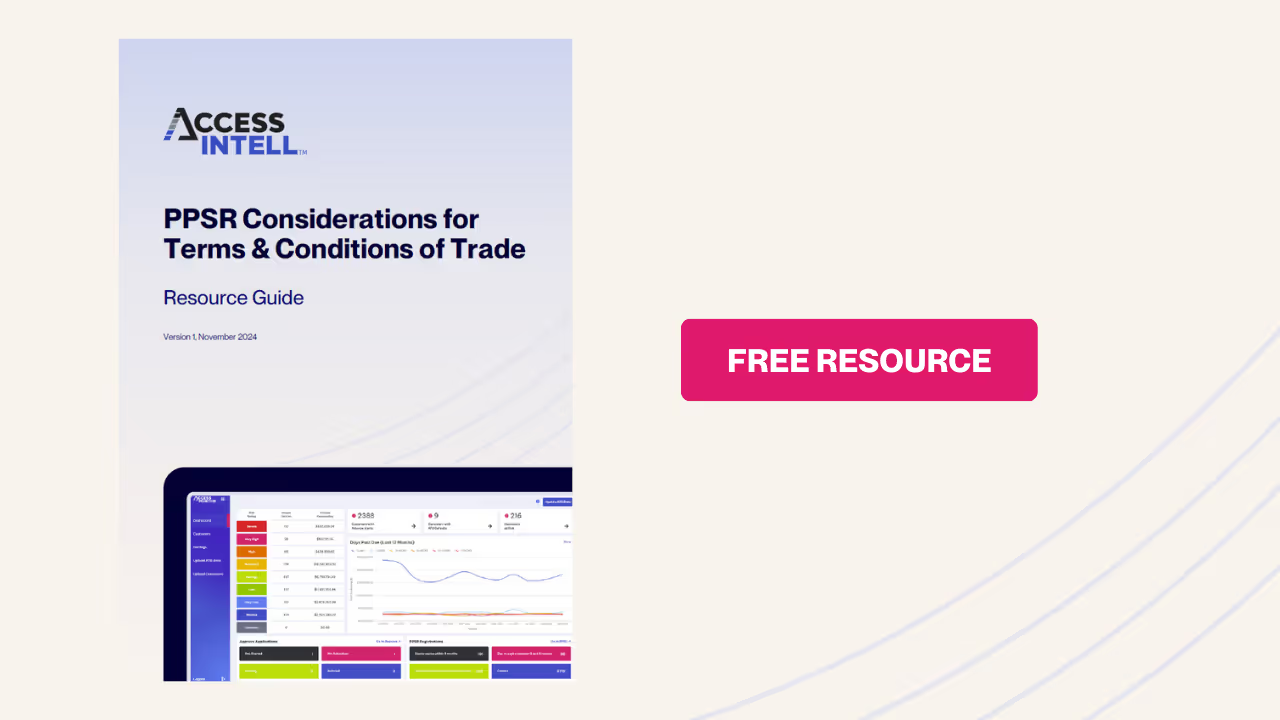Ultimate Guide to the Personal Property Securities Register (PPSR)
The Personal Property Securities Register (PPSR) is the single national noticeboard to search and register a security interest. This guide is a comprehensive look at how the Personal Property Securities Act (PPSA) affects businesses and how they can protect themselves against bad debts from insolvent customers. Registering on PPSR is the only way to obtain legal rights (and priority) to your supplied goods.
TLDR Summary:
If your business sells goods on credit, hires equipment, or finances assets you may be at risk. Ensure your business protects their security interests against insolvent customers with accurate registrations. Easy, effective and low-cost. A registration:
What is the PPSA?
The Personal Property Securities Act 2009 (PPSA) was introduced on 30 January 2012. It provides a regulatory framework for arrangements where one party takes security over supplied goods or an asset in a customer’s possession, acting as collateral for the debt.
What is the PPSR?
The Personal Property Securities Register (PPSR) is the single national register that individuals and organisations can access to register a security interest or to search whether a security is registered. By registering these interests through PPSR registration, businesses can establish a legal claim over the property, which can help protect their assets and reduce losses if a customer enters insolvency.
If your customer becomes insolvent:
- You rank as a secured creditor
- Administrators, liquidators and receivers are obligated to contact you upon appointment
- Correctly registered security enables suppliers to be first in line for payment (ranking ahead of the bank, ATO or any other creditor)
Watch Access Intell Founder and CEO Lynne Walton explain more about PPSR:
PPSR Definitions
Here we cover the main terms for a PPSR registration.
What is a secured party?
A secured party is the supplier with a registrable interest i.e. your business.
What is a grantor?
A grantor is your customer.
What is a security interest?
A security interest is a transaction where one party (normally a supplier or financier) takes security over supplied goods or an asset that is in a customer’s possession. In most cases this is to secure payment.
What is a security agreement?
The contract or arrangement that creates the security interest is a ‘security agreement’.
What is a collateral?
The stock supplied or asset secured is called the ‘collateral’.
What can be registered on the PPSR?
The properties you can register include items like the following:
- Motor vehicles: This includes cars, trucks, motorcycles, and other vehicles. It’s one of the most common types of property registered on the PPSR.
- Boats and watercraft: Boats, yachts, jet skis, and other watercraft can also be registered.
- Aircraft: This includes aeroplanes, helicopters, and other types of aircraft.
- Machinery and equipment: This can include anything from construction equipment to farming machinery.
- Stock and inventory: Businesses often register their stock or inventory on the PPSR.
- Artworks: High-value artworks can also be registered on the PPSR.
- Intellectual property: This can include patents, trademarks, copyrights, and other types of intellectual property.
- Financial property: This can include shares, debentures, or other financial instruments.
- Agricultural items: This includes livestock, crops, and farming equipment.
- Company assets: This can include a wide range of assets owned by a company, such as office equipment, furniture, and more.
It’s important to note that the PPSR does not cover real estate (land and buildings).
What are the different types of PPSR registrations?
- PMSI: A 'purchase money security interest' is typically used for secured property loans and supplying goods on credit.
- ALLPAAP: A registration that grants security over 'all present and after-acquired property'. It's the modern form of 'fixed and floating charges'.
Why should I do a PPSR search?
Before buying property or lending money, anyone can use the PPSR to see if a security interest has been registered on the personal property in question. Protect from risk by searching the Personal Property Securities Register (PPSR) for security interests against property, vehicles, individuals, organisations and more.
Why should I register on PPSR?
A PPSR registration greatly improves the position of suppliers who use retention of title as part of their risk management framework. As a secured creditor, suppliers of goods can expect to have:
- Legal priority rights to goods delivered which have not been paid for,
- Rights in manufactured goods, co-mingled goods or goods affixed to other personal property,
- Priority rights to proceeds derived from the sale of goods,
- Defence against a voidable preference claim by a liquidator, and,
- A solution to prevent ‘absconding’ debtors selling their business and leaving your debt unpaid.
What types of businesses register on PPSR?
If you’re selling goods on credit, hiring equipment, or financing assets, PPSR may be right for your business. The AFSA ‘State of Personal Property Securities System’ report shows that in the 2023-24 period, motor vehicles (70.8%) and registration of other goods (21.2%) such as equipment and merchandise drove new registrations. 68% of new registrations are for ‘financial and insurance services’ secured parties, with ‘wholesale trade’, ‘rental, hiring and real estate services’ and ‘manufacturing’ the other most common industries. The most common business types are listed below.
- Automotive
- Hire and rental
- Building and construction suppliers
- Hospitality suppliers
- Financial (read more in our article What Is PPSR & Why Do Financiers Need To Understand It)
- Wholesale
- Manufacturing
- Agribusiness and farming
How to register on PPSR
You’ll need to provide the following details for each registration:
- Secured Party Group i.e. you
- Grantor i.e. your customer
- Collateral Type i.e. commercial or consumer
- Collateral Class i.e. a description of the property (many different classes are grouped into four categories; tangible, general, intangible and financial)
- Type of Registration e.g. PMSI, ALLPAAP
Our article PPSR Toolbox for ‘out of the ordinary’ situations outlines a few not so commonly faced situations to help you navigate some of the practicalities of managing PPSR whilst maintaining enforceable security.
What happens if a customer I have a registration against goes into insolvency?
The Administrators, liquidators and receivers are obligated to contact you upon appointment. You’ll be listed as a secured creditor and will be first in line for payment. Our article How to successfully use PPSR to get paid goes into more details on your rights to help achieve an improved outcome. Read our case study Successful PPSA Retention of Title claim against customer in liquidation for a real-life example of how our client got paid.
Conclusion
PPSR is a vital tool in your credit management toolbox to protect your interests against insolvent customers. The legislation and register are complex and its important to ensure your registrations are accurate.
Citations
- Australian Financial Security Authority (2025), Personal Property Securities Register
- Australian Financial Security Authority (2025), State of the Personal Property Securities System 2023–24
- Australian Financial Security Authority (2025), Australia’s Personal Property Securities Register – AFSA statistics release June quarter 2025
PPSR Considerations for Terms and Conditions of Trade
Download our free guide which highlights considerations in Terms & Conditions of Trade insofar as they apply to the PPSA and the PPSR, for two distinct types of security interest – the sale of goods on credit terms subject to retention of title and the hire of equipment.

A Romalpa clause (or retention of title clause) in your terms and conditions of trade helps suppliers retain ownership of goods until payment is made. But without registering your interest on the PPSR, your rights may not be enforceable. Read our article for what you need to know.
A seven-year registration costs from $11 plus subscription to our PPSR management platform.
If a customer becomes insolvent, your claim will be at the bottom of the pile, and you’ll likely see only cents in the dollar of what you’re owed. If you’ve hired equipment to that customer, it can be sold to fund creditor payments, and you’ll lose your equipment.
A customer going into liquidation is devastating, but an additional concern for creditors is an unfair preference claim. You’ve done a great job collecting money owed, but now the liquidator is looking to claw that money back. Using the PPSR wisely can provide a powerful defence. Learn more about the defences available and best practices in our article How PPSR Protects Creditors From Unfair Preference Claims (Preferential Payments).
If you miss a renewal, your security interest is no longer protected. One of our clients learnt this the hard way, with an expired PPSR registration leading to a catastrophic $3 million financial loss. There is no ideal solution to resolve this we’re afraid. They all come with drawbacks. The best option depends on the type of security (finance, hire or sale), your exposure, the customer risk assessment and, commercially, whether the grantor is a key customer. Our article Your Options When You Miss A PPSR Renewal covers three general options to consider.
Why Use Access PPSR
Ready to help your business grow?
Book a tailored demo with our team to learn how we can automate the management of your PPSR registrations.
